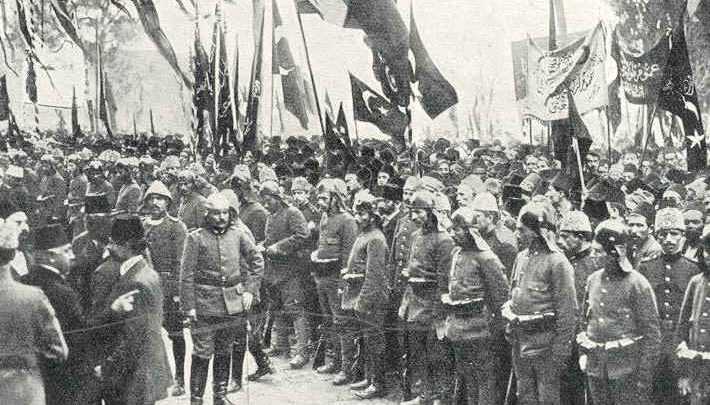Africa and Middle EastAllAllAllAsia and OceaniaEuropeResolvedResolvedResolved
Jihad of the Ottoman Empire
November 14th 1914 marked the day where the religious leader of the Ottoman Empire Skeikh-ul Islam declared an Islamic holy war on behalf of the Ottoman government. Here, Muslims residing in the Ottoman empire were encouraged to take up arms in the First World War.

The Ottoman empire was suffering greatly by the time of the outbreak of the Great War. Having suffered immense land loss a few years earlier during the First Balkan War, the Ottoman empire was seeking an alliance with a strong European power in order to safeguard the caliphate against future loss. The Young Turks responded favorably to advances by Germany. The Ottomans were especially worried about advances on their land by Britain, France, Serbia and Russia and their leader called a Jihad for all of the worlds Muslims to take up arms against enemies in the name of Islam.
The Ottomans were particularly sour with the Russians, following the Russo-Turkish war of 1875. Here, the Turks opposed minorities that were living in the Balkans, forcing Alexander II to intervene on behalf of the minority populations. The war concluded in 1877 when Alexander II’s armies marched from the Russian mainland towards Istanbul, forcing the Ottoman Empire to surrender to Russian military might. The resulting victory led to independence of states, namely Montenegro, Romania and Serbia. In addition, a new peace agreement was drafted between Russia and the Ottoman Empire. The agreement was dubbed the Treaty of San Stefano, formalized in February of 1878 where the defeated Turks was forced to recognize the independence of its former colonies.
These two key conflicts were integral to shaping Russia’s history, and gives a brief perspective into the military behaviors that still persist in the Russia the world knows today. Additional events, such as the abolition of serfdom, the rise and fall of the Communist party, all harken back to the political volatility of Russia and its surrounding neighbors.
The beginning of Turkey’s participation in the Great War occurred in October of 1914 when the Ottoman navy eluded British forces to attack Russian ports in the Black Sea. Shortly thereafter, the Sheikh made a declaration to all of the world’s Muslims to rise up and defend the Ottoman Empire in Jihad (holy war) as a part of their duty to Islam against its enemies. A small excerpt of the declaration read:
…the lot of those who remain alive is felicity, while the rank of those who depart to the next world is martyrdom. In accordance with God’s beautiful promise, those who sacrifice their lives to give life to the truth will have honor in this world, and their latter end is paradise.
The decline of the Ottoman Empire shortly thereafter in 1918 occurred with an armistice between the Young Turk empire and the Allied forces. This event strongly shaped the far and Middle East for years to come, as the imbalance of power in the region created a vacuum for resources and strategic control of a volatile region.


